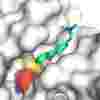In 2005, you funded research, led by Professor Awen Gallimore, that has helped launch clinical trials testing a promising new treatment option for people with bowel cancer. The research revealed how a specific group of immune cells in the body can ‘mask’ the immune responses normally triggered to fight the cancer, sparking clinical trials testing a drug that can remove these cells, unmask the immune system and open up the tumour for attack. It’s hoped that this treatment could help prevent the disease from returning and improve survival rates for those with bowel cancer.
We hope that BICCC will be important for people with colorectal cancer as currently after surgical resection and chemotherapy, there is no other treatment. People must hope that their cancer will not return. BICCC offers a new immune-based intervention that could significantly increase the chance of remaining cancer free.


Professor Awen Gallimore and her collaborators are currently setting up a clinical trial to test a new treatment approach for people with bowel cancer.
The trial, called BICCC (Brief Intervention with Cyclophosphamide in Colorectal Cancer), will involve giving low doses of the chemotherapy drug cyclophosphamide to bowel cancer patients whose cancer has not yet spread to other organs and have had their tumour removed by surgery.
The hope is that the treatment will reactivate the patient’s immune system to destroy any cancer cells that remain in the body after surgery, preventing the cancer from coming back.
The journey to this point has been a long one, and it’s thanks to our Curestarters that the team have been able to get here. In 2005, your support funded a project to explore an exciting new idea from Professor Gallimore and her team. They had recently discovered that tumours were able to evade the attack of the immune system because the presence of a special type of white blood cell (a regulatory T cell) was suppressing the immune responses that usually destroy tumours.
Professor Gallimore believed that reducing the activity of these white blood cells could release the full potential of the immune system to eradicate cancer cells.
Regulatory T cells play an important role in the normal functioning of the immune system. They suppress other types of immune cells, which is key in keeping the immune system under control and preventing damage to our own cells by mistake. Research has shown that regulatory T cells are linked to cancer progression because in their presence, tumours can survive the immune system’s defence mechanisms.
One key discovery Professor Gallimore made during her Worldwide Cancer Research project was that tumours have the power to increase the number of regulatory T cells present in their environment. By hijacking the activity of regulatory T cells, tumours can use them to their advantage and stay hidden from the immune system.
This discovery raised some exciting new questions that needed answering. Could they find a way to reduce the number of regulatory T cells circulating around the tumour? If so, would this unmask the power of immune system, allowing tumour growth to be slowed down or even stopped?
After further studies over the next few years, Professor Gallimore was able to transition this research from the lab to patients.
In 2012, she collaborated with Professor Andrew Godkin to start a small clinical trial testing whether giving low doses of the chemotherapy drug cyclophosphamide (which reduces the number of regulatory T cells) prior to administrating a cancer vaccine (TroVax), would boost the overall effect the vaccine has in terms of stimulating the immune system to attack tumours in people with colorectal cancer.
Results showed that cyclophosphamide did not enhance the effects of the vaccine. But surprisingly, patients who were given low doses of cyclophosphamide alone did have a better chance of surviving the disease.
This led to the BICCC trial, which aims to further test whether a low dose of cyclophosphamide alone is effective in preventing colorectal cancer from returning after surgery.
If BICCC is successful, cyclophosphamide could improve the current survival rates for bowel cancer, offering a significant new treatment option and reducing the uncertainty patients face of not knowing if their cancer will return.
By becoming a Curestarter, you can help us continue to support more bright ideas like Professor Gallimore's - allowing us to potentially uncover new knowledge about cancer that could lead to lifesaving new ways to prevent, diagnose, and treat cancer.


Donate now & become a Curestarter
Be part of a united effort to stop lives being cut short by cancer.



